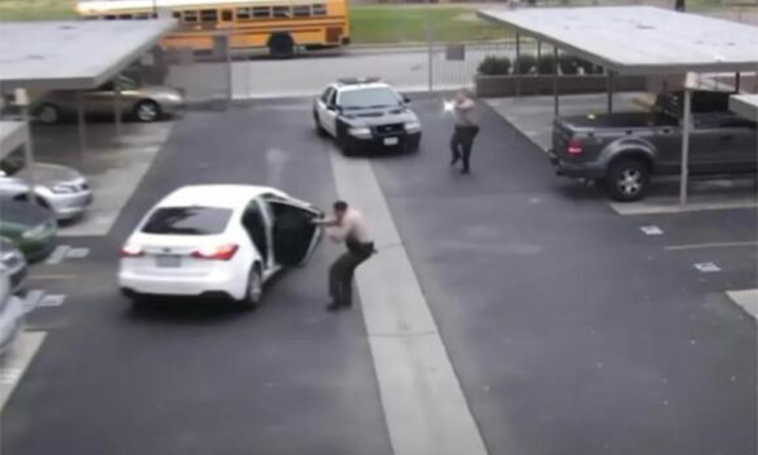Ex-Cop Gets 30 Days In Jail For Killing Unarmed Black Man In ‘Historic’ Conviction Called ‘Major Victory’.Racial justice groups called former Los Angeles County Sheriff’s deputy Andrew Lyons’ conviction last week “historic” as the first person in almost two decades to be found guilty in an officer-involved shooting. The controversial 30-day prison term Lyons received for shooting unarmed Black driver Randy Twyman tempers the euphoria.
In 2019, Lyons and another deputy approached Twyman in a parked car at a Willowbrook apartment complex, killing him. Deputies targeted Twyman, under a felony warrant for weapons crimes. Twyman reversed the car as the situation worsened, causing both deputies to fire. Lyons, armed with a semiautomatic assault weapon, fired the automobile when it stopped, killing Twyman with six gunshot wounds, half in his back.
“Mr. Twyman’s family received justice today after years of mourning. This verdict shows my office’s dedication to holding everyone accountable, regardless of occupation.”
Gascón, LA County District Attorney
Lyons negotiated a plea deal since the 34-round firing and autopsy revealed Twyman’s wounds showed excessive force. Lyons pleaded guilty to one felony count of assault with a semi-automatic firearm and one of assault under color of power after being charged with homicide. The drop in police brutality charges sparked accountability concerns.
Public controversy has erupted over the 30-day jail sentence and two-year probation. Critics say Lyons’ short sentence doesn’t reflect his crimes and questions the justice system. One social media user asked, “HOW IS THIS JUSTICE?” and claimed the system benefits whites.
Others see the conviction as a major win against police brutality. BLM-LA called it a “major victory,” saying Lyons was the first LA cop in 22 years to be imprisoned. While some applaud the development, others call it “Not even a slap on the wrist.”
The problem is compounded by the LASD’s history of disproportionate force, especially against Black and brown people. Tasering a Black guy seeking help and shooting Dijon Kizzee show a pattern of cruelty. LASD’s problematic activities, including publishing graphic photographs of Kobe Bryant’s helicopter crash and racist text messages from a former chief of staff, highlight the need for law enforcement reform.
Lyons’ conviction and Michel Moore’s resignation contributed to the day’s events. It was “A day of historic victories” for BLM-LA, which called Moore’s departure “Fired by the people!”
Public opinion on the controversial punishment has divided along ideological lines. Some are frustrated and skeptical of a 30-day jail sentence for taking a life, while others see it as a step toward holding police enforcement accountable.
The legal system’s fairness is debated on social media. A user said, “This didn’t do nothing but prove that the system wasn’t made for us; it was made for the white man only.” The sentiment is part of a larger discussion about police enforcement structural difficulties and racial inequities.
Los Angeles Chief of Police Michel Moore’s resignation changed the day. BLM-LA called it “A day of historic victories” and implied that Moore’s resignation was a result of collective action, saying, “Fired by the people!”
Lyons’ case becomes central to police accountability and reform concerns. The uncommon conviction may not address law enforcement’s systemic concerns, according to some. The need for justice extends beyond particular situations, requiring a look at the systems that cause them.
In conclusion, the various reactions to former deputy Andrew Lyons’ conviction highlight police accountability’s complexity. Some see it as a milestone, while others see it as a symbol of a justice system that fails to hold law enforcement accountable. Lyons’ story is a flashpoint and reminder of the need for police reform while the nation debates it.




Join the Community and Be a Part of the Conversation
You must be logged in or registered to post a comment.